Archives
24 October, 2017
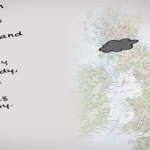
In the third of our series reflecting on the experience of running workshops with young people and schoolchildren, Sarah Crafter (The Open University) and Humera Iqbal (University College London) talk about a project that has as its focus young people and children who act as interpreters for their parents and families – and how this focus can enhance the empathetic understanding of pupils (the vast majority) who are not migrants themselves.
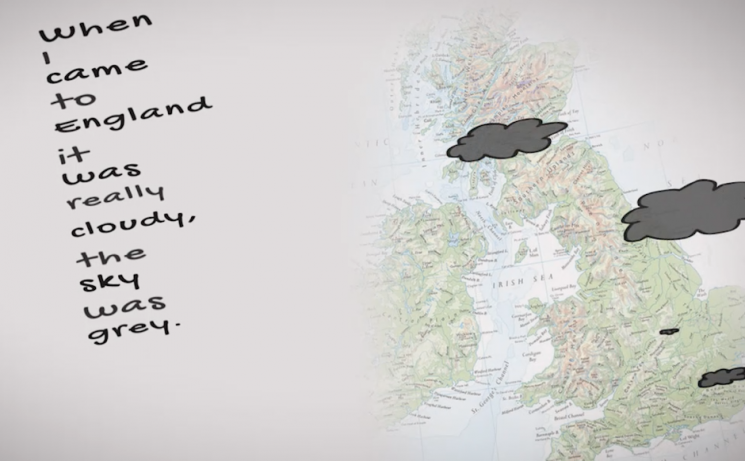
Animation and image by Alan Fentiman: http://bit.ly/2aVfHYw
‘When I was small and I moved in Milan, I used to live with my parents and uncles. I have really good memories with them until the age of 12. Unfortunately, I had to move to the UK, and they couldn’t come. This event changed me and the way I act.’ Safi, aged 15, (Bangladesh, Italy, UK)
Safi, aged 15, moved to Britain three years ago from Italy, having previously lived in Bangladesh. His childhood had been full of instances of resettlement. When young people, like Safi, migrate to a new country, they can often be left with a sense of loss: for people left behind and places they loved. At the same time, they can face new challenges in their new setting; getting to know new people, learning the language, culture, systems and structures in the new country.
We explored some of these themes at the workshop we ran in 2016 for the Migration Museum Project with a group of 65 local schoolchildren at their exhibition Call Me by My Name: Stories from Calais and Beyond. For quite some time we have been working with children and young people who have migrated with their families to a new setting in which they act as child language brokers – children and young people who interpret and translate for family and friends who can’t speak English. Over the years we have learnt that young people translate across lots of different situations and places like doctor’s surgeries, schools, banks, shops and workplaces. Sometimes they really enjoy being a young translator and take great pride in being able to help their families and friends. In other instances the conversations are difficult and people are not always very sympathetic. Many of the young people we speak to tell us, just as Safi did, how difficult it was to arrive in a new country and not be able to understand what people were saying. This sense of change and loss was also explored in the Call Me By My Name exhibition in relation to refugees, and we were able to identify many similarities between the exhibition and our research.
We built on some of these themes in the workshop. We asked the pupils to think about what it feels like to migrate, to be in a new place, to go into the unknown and to learn to communicate when there is no shared language. We started by showing a short animation from our research which features the voices of young people speaking about arriving in a new place and translating.
After watching the film, the young people gathered into groups to talk about some of the main themes that had arisen. This was quite a difficult task for some people, especially if they hadn’t experienced or thought about what it might mean to be a young translator or to migrate to a new country.
Yet, in truth, most of us can pinpoint a situation or feeling of being ‘out of place’ or alone, or unable to say what is in our minds. We wanted everyone to be able to capture that feeling and, to do that, we asked the pupils to put together a timeline map of their own experiences (working with timelines being something we have done in our research). We showed a timeline map made by a teenager called Kitty, who had migrated from Hong Kong to the UK with her family. It captured many markers of upheaval as well as instances of emotional change in different stages of Kitty’s life.
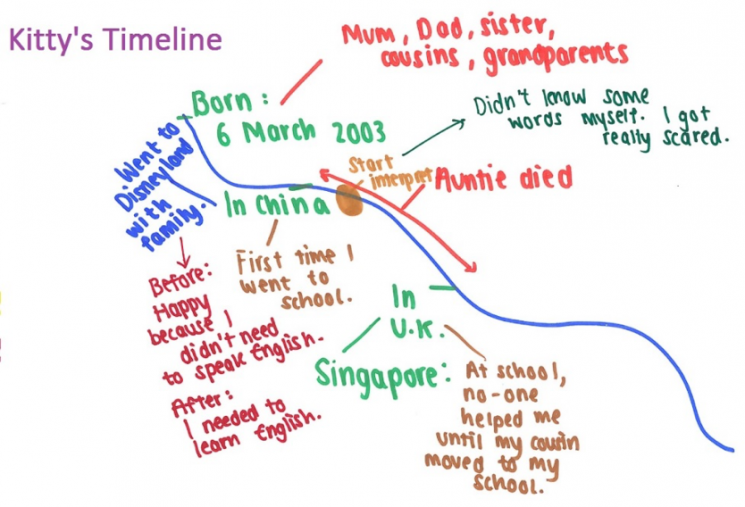
Using Kitty’s narrative as inspiration, the workshop pupils were asked to draw their own timeline, starting with the places they had lived or the places they had moved to (a house, a street, a country). The pupils then added people in their ‘migration timeline’ to get a sense of those who are always with us, those who come into our lives and those who fade out. Languages learnt and spoken were added. The pupils were encouraged to describe any ‘firsts’ they had experienced, such as the first time riding a bike, trying a particular food, reading something that made them cry.
This workshop was useful for the pupils because it enabled those who had never migrated to a new country, or learnt a new language, to gain a greater depth of empathy and understanding about how this must feel. In loading memories of newness, change, experience and important relationships, the pupils were encouraged to explore what their own feelings might be in moving to a new country and learning a new language. Our workshop also helped those pupils who had migrated, and who did speak a second language, to talk freely about their experience with their friends. We were impressed with how bravely they spoke to us, and their friends, about what that felt like for them. Teachers might also use similar exercises or prompts within school during citizenship and personal health and healthcare lessons, to explore issues of diversity.
You can find more information about our project here.
Dr Sarah Crafter is a senior lecturer in the Department of Psychology at the Open University in the UK. She has a PhD in Cultural Psychology and Human Development and is interested in cultural identity development and ‘non-normative’ childhoods. Her work with child language brokers grew out of broader interest in the constructions or representations of childhood in culturally diverse settings. Dr Humera Iqbal is a lecturer in psychology at the Department of Social Science at University College London. She is interested in identity and the migration experiences of families and young people, in particular how they engage with institutions in new settings. She is also interested in mental health and wellbeing in young people, particularly those from minority groups. Her research uses mixed methods as well as arts- and film-based methods.
18 October, 2017

In the second of three blogs on holding workshops with school pupils on the issues of migration, Umut Erel and Elizabeth Newcombe discuss an attempt to introduce pupils to the complexities of the language and the policy issues surrounding immigration, at a time of great global inequality and economic recession.
When holding a workshop for a school from Sussex at the Migration Museum Project’s Call Me By My Name exhibition in July 2017, it was striking to see school pupils becoming passionately engaged with issues of migration. The group of 15 pupils and their teachers arrived on one of the hottest days of the year, having already spent time wandering through London. Emily Miller, MMP’s head of learning and partnerships, started the workshop with an interactive game, using questions and movement in the space of the museum to break the ice and find out how everyone relates to migration. Some of the questions she asked were:
- Do you know someone who has migrated?
- Do you speak more than one language?
- Has anyone in your family migrated?
If our answer to these questions was ‘yes’, we had to take a step forward; if the answer was ‘no’, we were asked to take a step backwards. Soon most of us were concentrated in a tight circle in the middle of the room, and it had become clear that there was a lot of experience of migration, whether personal or indirect.

Drawing by Laura Sorvala.
The workshop then moved on to look at some of the key terms in the migration debate. A young refugee told of his experiences of migration, finding his way around life in the UK and how he now works in arts and education organisations in which he initiates dialogues on the experiences of refugees and migrants. All of us were stunned to hear of the difficulties he had overcome on his journey to the UK in the early 2000s. Some of the pupils shared their personal experiences of the country he came from and the countries he had passed through, which gave the encounter added poignancy.
After this informative and emotionally charged part of the workshop, we changed gears slightly and introduced a more academic take on the issues. Starting with an interactive exercise on global inequalities of income, we began to question the term migrant, pointing out that, when we use the terms ‘migrant’ and ‘refugee’, this does not refer to a legal figure or a dataset, but to a political figure. We discussed how British people living abroad almost always think of themselves as ‘expats’ not ‘migrants’, while Black Asian and Minority Ethnic (BAME) people who were born and have lived all their lives in the UK are often called ‘second generation migrants’. So, the decision about who counts as a migrant is often framed by assumptions about race, class and nationality.
When discussing migration, we often hear about the need to protect the welfare state from outsiders, but how can we understand the welfare state against the backdrop of global inequalities? We are living at a time of the highest level of global inequality in human history, when the wealth of 67 people is the same as the combined total of the world’s 3.5 billion poorest people, and the poorest 50 per cent of the world have 6.6 per cent of total global income. There are issues with the methodology of these estimates, but it cannot be denied that the world has changed from the 19th century. Today, for most people in the world, what is key to your life chances is the country you live in. The fear for those living in wealthier states is that there are a lot of people who are hard up in the world and that, if you don’t have much, you need to hold on to it.
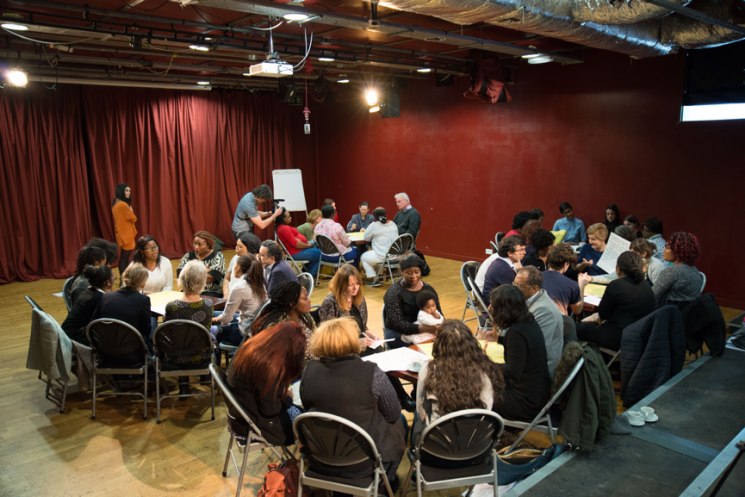
Photo of the PASAR project’s ‘From Margins to Centre Stage’ workshop, February 2017 © Marcia Chandra.
Migrant families’ exclusion from the welfare state was a topic in another research project – Participation Arts and Social Action in Research (PASAR) – we are currently running with our colleagues Erene Kaptani (Open University), Maggie O’Neill (University of York) and Tracey Reynolds (University of Greenwich). The PASAR project conducted participatory research with migrant mothers affected by the policy No Recourse to Public Funding (NRPF), which means migrants who are subject to immigration control are not allowed to access benefits, tax credits or housing assistance. This policy affects both migrants who have the right to remain in the UK and those who are undocumented. The policy pushes these migrant families – many of whom include young children, who are among the most vulnerable people – to the margins of society through poverty and racism. In a workshop with policy makers, practitioners and activists, we worked with a group of migrant mothers affected by NRPF to enable their collective voice to be heard. To do so, we showed a short theatre piece developed through the research.
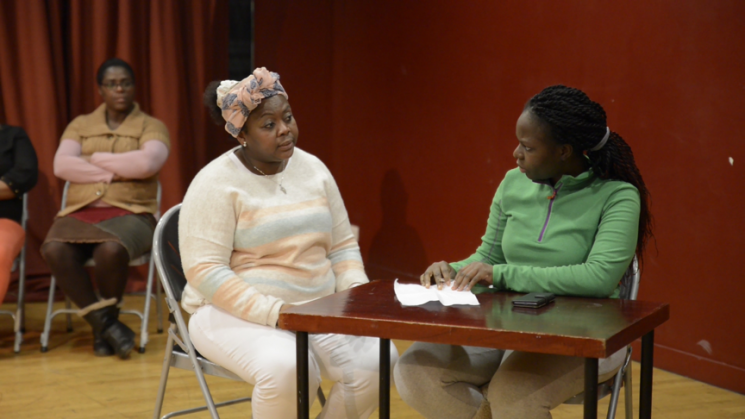
Photo from PASAR project theatre scene © Marcia Chandra.
At the schools’ workshop, we watched a short scene from this theatre piece about Elaine’s experience. Elaine had been working for many years for a large supermarket. She needed to take time off every two weeks to sign into the Immigration Reporting Centre, a requirement of the Home Office. Her manager used his knowledge of her vulnerability to bully her and change her onto an unfavourable night shift, even though she had just had a baby. Her union representative’s response was that as an immigrant she should be glad to have a job. She also experienced stigmatisation by fellow workers, who saw her as an ‘illegal’ immigrant. Eventually, she lost her job – unable to pay rent, Elaine, her husband and six-year-old son have for four years now been living in the houses of friends and acquaintances, surviving on their monetary support.
This example shows how racism, anti-immigration policies and austerity intersect. An increasingly hostile climate to immigration has made it more difficult for migrants to find formal and informal employment. As a consequence of increasingly stringent migration regulations, particularly since 2012, more and more migrant families are subject to migration control, prevented from accessing public funds and rendered unable to economically support themselves (Price and Spencer, 2015). In a situation of crisis – through the loss of jobs or accommodation, relationship breakdown or health problems – they cannot draw on the relative safety net of the welfare state to help them overcome these points of crisis and are pushed more and more to the margins of society.
Having watched a short video clip of these theatre scenes with the school pupils, we had an interesting discussion about some of the issues raised by Elaine’s story:
- How can labels such as ‘illegal migrant’ be misleading and stigmatising?
- Why are some people, and not others, allowed to draw on welfare services?
- Should contributions through work be the criterion for deciding whether migrants can participate in the welfare state?
- Should there be other criteria for inclusion into welfare, based on colonial and postcolonial ties?
- Should there be criteria based on shared humanity?
It is hard to summarise the workshop, as it was rich and varied, but it seems to me that this variety of modes of engagement (personal testimony, interactive activities, and audio-visual material and information) has been fruitful in raising many questions, showing the complexity of issues of migration and welfare, and linking conceptual discussions to personal experiences of migration, which are often far richer than those portrayed in public debate. While teachers challenged us as academics to present information in accessible ways, especially for pupils who are still learning English, their feedback was heartening: ‘Our students learnt a lot from the experience both about migration at the human level but also the bigger picture of why these issues are so pressing for the UK at the present time. A great day well spent!’
Reference
Price, Jonathan, and Spencer, Sarah (2015) Safeguarding Children from Destitution: Local Authority Responses to Families with ‘No Recourse to Public Funding’. Oxford: COMPAS.
Umut Erel is Senior Lecturer in Sociology at the Open University. She is Principal Investigator of PASAR, an ESRC-funded research project investigating the opportunities and challenges of using participatory theatre and walking methods for social research.
Emma Newcombe is the Head of External Relations for COMPAS and the Global Exchange on Migration and Diversity. She oversees all COMPAS’s communications work, and also supports the development of the ESRC Urban Transformations project. She has an MA in Migration Studies from the University of Sussex and a BSc in Social Policy from the University of Bristol.
25 March, 2019
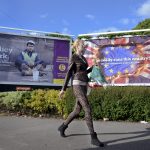
An eastern European woman passes UKIP posters on West Street in Boston, Lincolnshire. Renamed by locals as ‘East Street’, this busy shopping area caters to the large eastern European communities in the town, most of whom work in the agriculture, horticulture or service sectors, including those catering to their own communities’ needs.
12 October, 2017
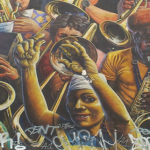
As Britain’s towns and cities become increasingly diverse, teaching about multicultural becomes more and more important. ‘Minority’ groups are found no longer only in large (post-) industrial cities like Manchester or Birmingham but also in smaller urban centres like Boston and Peterborough. The maps show census data which reflects these changes, with the green and blue shadings indicating more diverse areas. The changes from the 1991 map to the 2011 map reveal more areas becoming diverse, and already diverse areas – such as parts of London – becoming even more diverse.
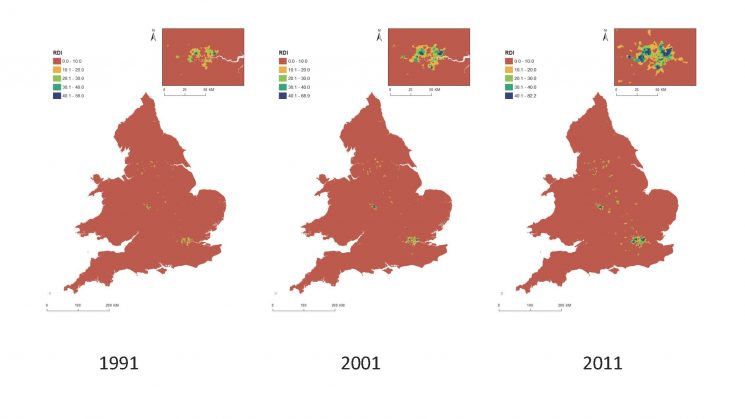
Source: Gemma Catney (2016) ‘The Changing Geographies of Ethnic Diversity in England and Wales, 1991–2011’, Population, Space and Place, Volume 22, Issue 8, 750–65.
The geographies of multiculture have changed and are continually changing, so that all areas, and the schools they contain, need to think about how people engage with cultural diversity and difference. As part of the Migration Museum Project’s Call Me By My Name exhibition in 2016, we ran a teaching workshop to help students think about their own identity and how they identify and relate to others in their daily lives. Our workshop took place in the space of the exhibition, surrounded by photographs, artwork and artefacts that brought into the room personal experiences of migration, refugee camps, loss of home and loved ones and experiences of moving to the UK. Haunting the space were the fake ‘life’ jackets used by migrants and found on beaches, exhibits counting relatives lost in perilous sea crossings and the vulnerability of lives lived in camps, at borders and on the margins of societies.
We began the workshop with Year 8 students by asking them to walk around the room. When we clapped, they had to form into self-selecting groups of four or five (i.e with no intervention from ourselves) and we asked them to draw around both their hands on A4 sheets of plain paper. They then wrote on their left-hand outline words that describe how they see themselves and on their right-hand outline words that they think other people would use to describe them. Next, they were asked to talk in their groups about the words they had used to describe each hand, and how they felt about the words others might use to describe them. After a few minutes of these group discussions, in the course of which we mingled and chatted, a few students stood up to talk about their hand drawings and labelling.
The aim was to open up questions of cultural identity and to think how inadequate words and categories are for capturing complex and shifting identities. One person, for example, labelled themselves as Somalian, from Milton Keynes, and moving from Sweden – and even then they were aware that these labels didn’t really capture who they were but were ways they used to help others position them. When it came to how others might label them, however, they replied ‘African’ or ‘black’. In most cases, there were differences between how people identified themselves and how they thought others would identify them.
We asked the students why they sat with whom they did, because we were also interested in the ways in which groups form. One group of young men were largely of Ghanaian origin and were vocal and confident; other groups were a bit more mixed ethnically and nationally, with only one or two putting themselves forward as spokespeople.
The dynamics of the room were used as a way of thinking about the small-scale geographies of multiculture. While the school body was very mixed ethnically, like many classrooms across the UK, groups sometimes followed particular ethnic and national lines. Most students were used to using ethnic and racial labels like ‘white’ or ‘African’, but were equally aware that these were quite blunt categories which concealed lots of complexity and contradictions.
It is these same everyday ‘micro’-geographies that we explored in a research project called Living Multiculture: the new geographies of ethnic diversity and the changing formations of multiculture in England, which we conducted as part of a team led by Professor Sarah Neal.
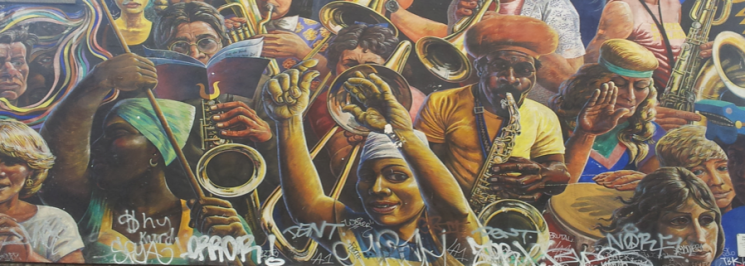
Mural in Hackney, east London. ©Author’s own
The Living Multiculture project started from the reality of the changing geography of ethnic diversity in contemporary Britain – the patterns shown in the maps above. Places are changing, and we wanted to understand how people understand and live through these changes. We also wanted to examine ‘everyday’ encounters across ethnic difference against the background of the popular image, in the media and among many politicians, that multiculturalism in Britain had ‘failed’ – particularly post-BREXIT – and that cities are riven with segregated neighbourhoods and ethnic and racial tension. It was not that we wanted to turn a blind eye to very real conflicts, but to argue that, for many people, most of the time they rub along. Our main question was ‘How do people live and experience multiculture as part of their everyday lives?’
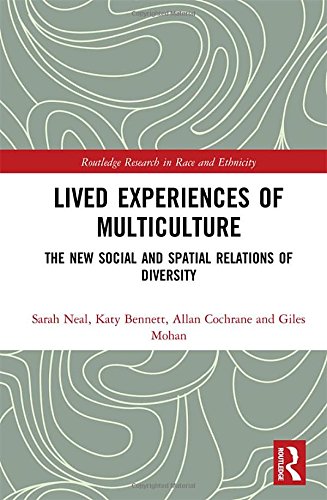
We studied this question through fieldwork in three areas, each of which represented a different aspect of Britain’s changing ethnic geography.
- Some cities that were already diverse are becoming ‘superdiverse’ with the arrival of new migrant groups. For this group, we chose the Borough of Hackney in London.
- Some ethnic groups that first settled in inner cities are now moving outwards, as their social and economic status improves. For this group, we studied the newly diverse suburb of Oadby in Leicestershire.
- As noted, some large towns and small cities are becoming diverse for the first time – for this, we chose Milton Keynes as an example.
You can find out more on our website and in a new book we have co-authored with the rest of the team, but some of the key findings are:
- We studied the places where people gather and mingle – cafes, parks, libraries and colleges. We found that these are important sites for people to be together in quite relaxed and informal ways, even though a lot of thinking and design goes into making them seem informal. For example, in the chain restaurants we studied, it was the informality of the fast-food model that enabled people to rub shoulders in easy ways.
- We also found that ‘things’ and places matter to these relationships. The design of internal college spaces or shopping malls all aided flows of people or encouraged mingling. Mundane things like park benches or car parks were all crucial for allowing people to encounter one another.
- But social skills were also important for living cultural difference. Managing the un/easiness of being thrown together in a room with us and being asked questions about identity involves considerable skills. One such skill students used was knowing how and when to joke with whom. Like some of our respondents, they knew that ethnic labels concealed as much as they revealed, and they could push the boundaries of these labels without generally causing offence. It was this knowing-ness about how to get along with diversity that came through in our workshop and which we explored in our various research contexts.
Drawing around your hands might seem playful, but it opens up a whole series of questions about the micro-geographies of multiculture.
Dr Katy Bennett is an Associate Professor in the Department of Geography at the University of Leicester, where she works on questions of social and cultural geography, especially identity, emotion, home, community and multiculture. Professor Giles Mohan is at the Open University and works on international development and migration. Together they were part of a team headed by Professor Sarah Neal called Living Multiculture. Out of this project the team has just published a new book called Lived Experiences of Multiculture: The New Social and Spatial Relations of Diversity, details of which can be found here.













